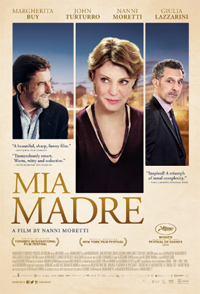Mamma Mia: Moretti’s Continues Exploring a Death in the Family
 After having won the Palme d’Or in 2001 for his film The Son’s Room, Italian director Nanni Moretti resumes with a similar motif with his latest, Mia Madre. Except, rather than a family dealing with an unexpected absence, here we have the opposite perspective, that of the grown children dealing with the inevitable death of their ailing parent. Ungainly in its structure as it examines the struggles of its lead protagonist as she handles both family and professional dilemmas, a rewarding performance from Margherita Buy tends to compensate for the film’s shortcomings.
After having won the Palme d’Or in 2001 for his film The Son’s Room, Italian director Nanni Moretti resumes with a similar motif with his latest, Mia Madre. Except, rather than a family dealing with an unexpected absence, here we have the opposite perspective, that of the grown children dealing with the inevitable death of their ailing parent. Ungainly in its structure as it examines the struggles of its lead protagonist as she handles both family and professional dilemmas, a rewarding performance from Margherita Buy tends to compensate for the film’s shortcomings.
Margherita (Buy) is in the midst of shooting a new film concerned with labor and employee relations. As she films around the American actor Barry Huggins (John Turturro) soon set to join the production, the already harried director additionally is forced to contend with her mother Ada’s (Giulia Lazzarini) worsening medical condition. Margherita does her best to attend to her mother while she stays in the hospital, a responsibility shared with her brother, Giovanni (Nanni Moretti), who has taken a leave of absence from work to devote himself to Ada’s care. Guilty for being unable to devote the same amount of time, Margherita’s issues are further compounded by her adolescent daughter, Livia (Beatrice Mancini), who has been shirking her studies and deliberately not communicating with her mother on several important issues. When the exuberant Huggins arrives in Italy, his bombastic behavior further aggravates Margherita, struggling to hold it all together, though she uses her schedule to deflect some inevitable realizations about her own behavior.
The irony we’re supposed to take away from Margherita’s film project, which looks and sounds like a project we’d see from Jean-Pierre and Luc Dardenne, is that she’s crafting something meant to explore the voice of the working class, an instrument for ‘the people,” and yet she’s the tyrannical dictator in her own environment. That’s not to say she’s monstrous or despicable, but simply oblivious to her dismissive and sometimes contemptuous attitude towards others. However, her character faults are downplayed through the film and it doesn’t help that Moretti prefers to keep the tone consistently comedic.
Margherita’s behavior on set seems perfectly justifiable, and that’s generally where we see her in action. When she’s faced with some verbalized criticism, it seems news to us as well. A small handful of pointed sequences tend to stick out, particularly in several flashbacks where we how Margherita treated her mother before the illness, including a violent instance involving Ada’s vehicle. But most of the moments anchored in the film’s present tense tend to borderline the overwrought, such as another moment where we find Margherita barking at her mother to walk the three paces from her hospital bed to the bathroom.
What Mia Madre does manage is to showcase the talents of actress Margherita Buy, but she’s the only developed character in the film. Moretti’s onscreen presence as her brother seems unnecessary, adding little familial texture for a character that could’ve been played by anyone. Distractingly, we spend most of our time languishing in the comic relief of John Turturro, who is entertaining, but used so frequently and broadly that he begins to feel like a crutch to pad the running time. Without any other distinguishable characteristics evident in Mia Madre (sharing its name with the 2004 French adaptation of Georges Bataille from Christophe Honore, Ma Mere, a markedly different tale of matriarchal woe), Moretti’s film plays like a standard issue familial drama.
Reviewed on May 16th at the 2015 Cannes Film Festival – Main Competition. 102 Mins.
★★½/☆☆☆☆☆


